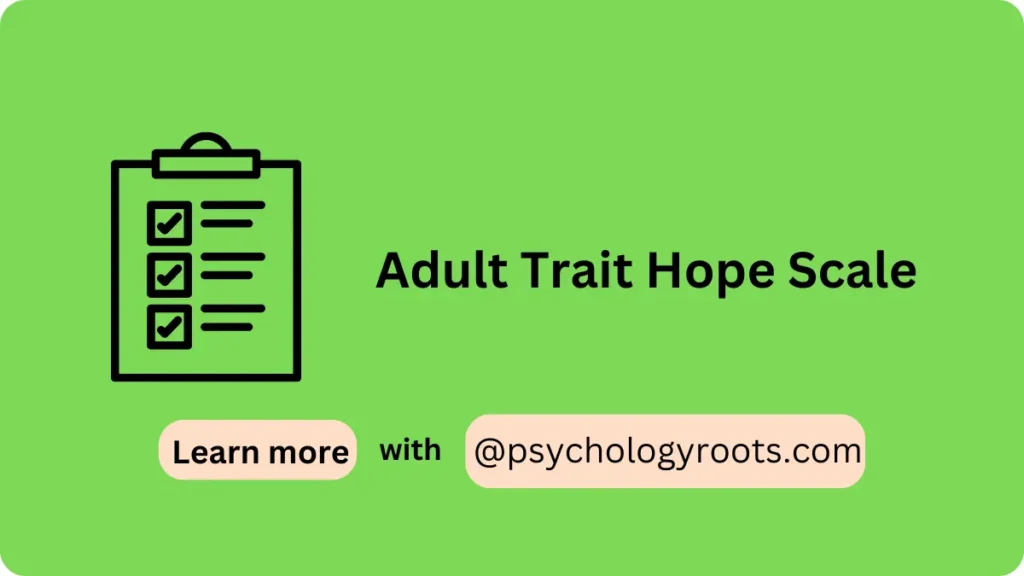Table of Contents
Adult Trait Hope Scale
Here in this post, we are sharing the “Adult Trait Hope Scale”. You can read psychometric and Author information. We have thousands of Scales and questionnaires in our collection (See Scales and Questionnaires). You can demand us any scale and questionnaires related to psychology through our community, and we will provide you with a short time. Keep visiting Psychology Roots.
About Adult Trait Hope Scale
Scale Name
Adult Trait Hope Scale (Adult Hope Scale)
Author Details
C.R. Snyder and his colleagues
Translation Availability
Not Sure

Background/Description
The Adult Trait Hope Scale was conceptualized based on Snyder’s cognitive model of hope, which defines hope as a positive motivational state. This state is driven by a sense of successful agency (goal-directed energy) and pathways (planning to achieve those goals). Introduced in 1991, the ATHS has become a pivotal tool in psychological research for measuring an individual’s level of hope as a stable personality trait. The scale’s development was part of Snyder’s broader work on positive psychology and goal attainment, focusing on how individuals maintain motivation and devise strategies to reach their objectives.
Administration, Scoring and Interpretation
- Preparation: Ensure a quiet environment for participants to complete the scale.
- Instructions: Explain the purpose of the scale and how to respond to the items.
- Questionnaire: Administer the 12-item questionnaire, where respondents rate each item on an 8-point scale from definitely false to definitely true.
- Scoring: Calculate the total hope score by summing the responses to the agency and pathways items. The scale includes four items for each subscale and four filler items.
Reliability and Validity
The Adult Trait Hope Scale has demonstrated high internal consistency and test-retest reliability. It is validated through numerous studies showing its effectiveness in various contexts, including its correlation with psychological well-being and resilience. The scale’s validity is supported by its ability to predict positive outcomes, such as successful goal achievement and overall mental health.
Available Versions
12-Items
Reference
Snyder, C. R., Harris, C., Anderson, J. R., Holleran, S. A., Irving, L. M., Sigmon, S. T., … & Harney, P. (1991). The will and the ways: development and validation of an individual-differences measure of hope. Journal of personality and social psychology, 60(4), 570.
Snyder, C. R. (1994). The psychology of hope: You can get there from here. Simon and Schuster.
Snyder, C. R. (2002). Hope theory: Rainbows in the mind. Psychological inquiry, 13(4), 249-275.
Important Link
Scale File:
Frequently Asked Questions
Q1: What does the Adult Trait Hope Scale measure?
A1: It measures an individual’s overall level of hope, focusing on goal-directed energy (agency) and planning to achieve goals (pathways).
Q2: How long does it take to complete the scale?
A2: It typically takes about 5-10 minutes to complete the 12-item questionnaire.
Q3: Can the scale be used with different populations?
A3: Yes, the scale has been validated across diverse populations and age groups.
Disclaimer
Please note that Psychology Roots does not have the right to grant permission for the use of any psychological scales or assessments listed on its website. To use any scale or assessment, you must obtain permission directly from the author or translator of the tool. Psychology Roots provides information about various tools and their administration procedures, but it is your responsibility to obtain proper permissions before using any scale or assessment. If you need further information about an author’s contact details, please submit a query to the Psychology Roots team.
Help Us Improve This Article
Have you discovered an inaccuracy? We put out great effort to give accurate and scientifically trustworthy information to our readers. Please notify us if you discover any typographical or grammatical errors.
Make a comment. We acknowledge and appreciate your efforts.
Share With Us
If you have any scale or any material related to psychology kindly share it with us at psychologyroots@gmail.com. We help others on behalf of you.